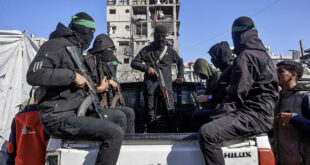 Israeli air stirkes in Lebanon have killed 27 civilians and forced the closure of Beirut’s international airport. An Israeli woman was also killed after Hezbollah fired rockets across the border with Israel into the northern town of Nahariya.
Israeli air stirkes in Lebanon have killed 27 civilians and forced the closure of Beirut’s international airport. An Israeli woman was also killed after Hezbollah fired rockets across the border with Israel into the northern town of Nahariya.
Â
The closure of the new Rafiq Hariri airport on Thursday came after witnesses reported at least two strikes on a runway while Lebanese anti-aircraft batteries fired at Israeli fighter jets.
Â
Flights are being diverted to Cyprus.
 The Israeli military confirmed that its aircraft carried out attacks on Beirut’s international airport.
 “The airport is used as a central hub for the transfer of weapons and supplies to the Hezbollah terrorist organisation,” an Israeli army spokesman said.
 Israel also bombed bridges linking south Lebanon to the rest of the country and the building housing Hezballah’s Al-Manar television station in Beirut, Aljazeera’s correspondent in Beirut reported.
 In southern Lebanon, 10 members of the Adil Akashi family and seven members from the family of Muneer al-Zain family were among those killed in the Israeli bombings, an Aljazeera correspondent said.
 A 40-year-old Israeli woman was killed when a rocket fired from Lebanon hit her house in Nahariya, the Magen David Adom ambulance service said. The army said at least two rockets hit the coastal city.
 Hezbollah said it had fired 60 rockets at Nahariya, south of the Lebanese border.
 The Israeli army said Hezbollah had fired a number of rockets and mortars at other areas in northern Israel.
 One rocket landed in the Israeli town of Zarit, wounding one civilian.
 On Wednesday, the two Israeli soldiers were seized at about 9am (0600 GMT), across the border from Aita al-Shaab, 15km from the Mediterranean coast.
 Three Israeli soldiers died in the raid, while four more were killed when their tank ran over a landmine. The eighth soldier died while helping to recover the tank, the Israeli army said.
 Israeli officials said the idea behind the air attacks is to exert pressure on the Lebanese government to deal with Hezbollah.
 The prime minister described Wednesday’s attack as an act of war by Lebanon and promised a “severe response”, with the government giving the green light to military action against Hezbollah after an emergency cabinet meeting.
 “It is an act of war by the state of Lebanon,” said Ehud Olmert, and the cabinet promised a response with “appropriate severity”.
 Sayyed Hassan Nasrallah, leader of Hezbollah, said the soldiers had been seized to push Israel to release prisoners.
 “What we did … is the only feasible path to free detainees from Israeli jails,” he told a news conference in Beirut.
 But Israel said on Thursday that it would not swap prisoners held in its jails for the two captured soldiers.
 Gideon Meir, an Israeli foreign ministry official, said: “You don’t negotiate with terror organisations.”
 Nasrallah said Hezbollah had repelled an Israeli force that tried to enter Lebanon to find the captured soldiers.
 Footage on Al-Manar television showed a smouldering Israeli jeep. It also showed smoke rising from an Israeli border post.
 Hezbollah supporters set off fire crackers and distributed sweets in the streets of Beirut in celebration of the attack.
 Mothers of Lebanese prisoners in Israeli jails expressed hope to Aljazeera that the Hezbollah attack could increase the possibility of their relatives being freed, while in Gaza the families of some Palestinian prisoners also welcomed the attack.
 Israeli troops have not struck so far into Lebanon since they withdrew from the southern border area in 2000. Hezbollah’s Shia fighters had waged an 18-year campaign against them.
 Eurasia Press & News
Eurasia Press & News



